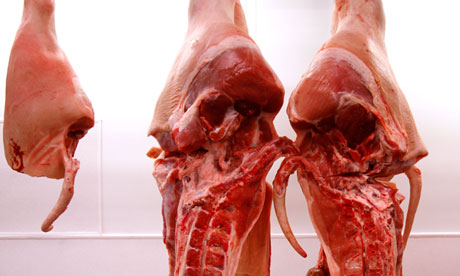Horsemeat scandal blamed on European meat regulation changes
Food expert says redefinition of meat meant manufacturers had to look overseas for cheap replacements

Unprocessed, natural meat at Smithfields meat market in London. Photograph by David Levene Photograph: David Levene for the Guardian
The UK's horsemeat scandal was in "large part" the result of a switch from UK to foreign meat suppliers in 2012 caused by an abrupt change in European regulation that the government failed to contest, according to the expert who led the Food Standards Agency's (FSA) surveillance programme for a decade.
The change meant that "desinewed meat" (DSM), a fine mince rubbed under pressure from carcasses, could no longer be called meat on packaging. DSM produced in the UK was the main ingredient in most value-range burgers, sausages, pies and kebabs and the change meant that thousands of tonnes of meat had to be sourced from elsewhere and at low cost.
"You would think it would set alarm bells ringing but it did not," said Dr Mark Woolfe, head of food authenticity at the FSA until 2009. "There was an obvious risk. The companies were seeking a low price and that is asking for trouble."
"In principle there should not be anything wrong with a company going abroad for meat, as the EU has the same rules," said Woolfe. "But in practice, the longer and more complex the supply chain, the more difficult it is to control. That is a lesson we have learned the hard way."
Woolfe said the food industry got only a couple of days of notice of the change. "It was very badly done," he said. "The government did not fight the decision of the European commission (EC), they accepted it, which I thought was a great shame. Food retailers also seemed to be very unconcerned about the change. Everybody bowed down to the EC decision."
A spokesman for the Department for Environment, Food and Rural Affairs said: "Not complying with the changes to de-sinewed meat rules would have risked a devastating ban on UK meat exports and we worked hard to minimise the impact on the food industry. It's wrong to say this prompted the subsequent contamination of meat products, but in any case there's absolutely no excuse for any food to be knowingly mislabelled."
Michael Walker, a founder board member of the FSA and now at the privatised Laboratory of the Government Chemist, defended the EC decision: "We need to be honest about what is going into food and that is what the EC was trying to do."
But he accused the government of complacency before the horsemeat scandal erupted. "We should not let this fade away without taking steps to prevent us being on the back foot again," he said. Walker said testing had discovered horse and donkey contamination in food in 2003, but that after the outcry died down, it was assumed the problem had gone away and that absence of evidence was used to infer the absence of any problems. "This should not happen again. The UK government used to be the world leader in food authenticity."
Woolfe also criticised policies that saw the FSA losing its responsibilityfor food enforcement, which was delegated to 330 local authorities. "It is unfortunate that the UK more or less ran down their surveillance," he said. "The FSA then had to rely on information from other European countries and from local authorities."
Previously, he said, a lot of FSA testing surveys were prioritised on the basis of industry intelligence that came from a committee that has since been disbanded. He added that local authority food enforcement services were substandard and poorly funded "Cinderella operations".
Woolfe said that DSM had been developed to replace "mechanically recovered meat" (MRM), a "toothpaste" like product with no muscle fibre structure, after the latter was banned from being described as meat on packaging. But EC inspectors, who visited the UK in March 2012, thendecided that DSM also failed to adequately meet the description of meat. The two main UK companies both subsequently abandoned production of beef and lamb DSM, Woolfe said.
"Until the change, most [meat in low-priced products] would have come from the UK, and was therefore much easier to control," he said. "The change has probably contributed in large part [the horsemeat scandal]. Food companies squeeze the supplier. They weren't prepared to give the suppliers more money, so it forced the suppliers to find cheap new sources."
Dr Chris Smart, a food expert from Leatherhead Food Research, said: "It is a shame that testing by the FSA has been reduced. I am sure there will be other crises that come along in the next few years."
No hay comentarios:
Publicar un comentario